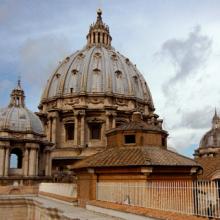cardinal george pell
One of the most senior officials in the Vatican took a leave of absence and pledged to defend his name after being charged with multiple historical sex crimes in Australia.
Cardinal George Pell, one of Pope Francis’ most trusted advisors and head of the Holy See’s finance department, is the highest ranking official in the Catholic Church to face abuse charges.
Collins, who was sexually abused by a priest at age 13, resigned on March 1, citing what she called “shameful” resistance to commission proposals from the Vatican’s powerful doctrinal office, which is responsible for pursuing cases against abusive priests and bishops.
Saunders stepped aside after publicly calling for Australian Cardinal George Pell to be dismissed, after news reports surfaced that he had protected pedophile priests in Australia. Pell serves as the Vatican’s finance chief.

Image via REUTERS / Filippo Monteforte / Pool / RNS
Pope Francis says he will not address sexual abuse allegations against the Vatican’s finance minister, Cardinal George Pell, until Australian judicial authorities complete their investigation.
In a press conference on the papal flight returning from World Youth Day in Poland late July 31, the pontiff said the allegations against Pell “are in the hands of the justice system” and the cardinal should not be judged “before the justice system judges.”

Image via REUTERS/Alessandro Bianchi/RNS
The Vatican has put a stop to the work of international auditors just months after they were hired to review the city-state’s bookkeeping — a move said to have surprised Pope Francis’ handpicked financial czar, Cardinal George Pell. The suspension earlier this month of the audit, well underway by the global firm PricewaterhouseCoopers, was also viewed as threatening the pope’s broader efforts to clean up the Vatican’s murky finances.
Pope Francis has approved the first-ever system for judging, and possibly deposing, bishops who fail to protect children from abusive clerics, a major step in responding to Catholics who have been furious that guilty priests have been defrocked while bishops have largely escaped punishment.
The five-point plan on accountability for bishops originated with the special sex abuse commission that Francis set up to deal with the ongoing crisis, and after some modifications, his nine–member Council of Cardinals signed off on it and Francis gave his final blessing to it on June 10.
More than 55,000 people have signed a petition calling for Cardinal George Pell to return to his native Australia and face a government commission on child sex abuse, after allegations that he tried to bribe the victim of a pedophile priest.
Addressed to Pope Francis, the Change.org petition calls for Pell — the Vatican’s financial chief and former archbishop of Sydney — to answer questions from Australia’s Royal Commission into Institutional Responses to Child Sexual Abuse.
The Roman Catholic Church in Australia acknowledged that “obligatory celibacy” may have contributed to decades of clerical sexual abuse of children in what may be the first such admission by church officials around the world.
A church advisory group called the Truth, Justice and Healing Council made the startling admission Dec. 12 in a report to the government’s Royal Commission, which is examining thousands of cases of abuse in Australia.
The 44-page report by the council attacked church culture and the impact of what it called “obedience and closed environments” in some religious orders and institutions.
“Church institutions and their leaders, over many decades, seemed to turn a blind eye, either instinctively or deliberately, to the abuse happening within their diocese or religious order, protecting the institution rather than caring for the child,” the report said.
Pope Francis’ promised reforms of the Vatican bureaucracy are starting to take shape, with new leaders appointed to oversee the troubled Vatican bank and plans to overhaul the Catholic Church’s approach to global communications.
Six new lay members, including Mary Ann Glendon, a former U.S. ambassador to the Holy See and Harvard law professor, will join the bank’s board.
Pope Francis and his council of eight cardinals are unlikely to complete a radical shakeup of the Holy See’s administration, or Curia, before 2015, the Vatican said Tuesday.
Francis joined the council’s discussions in between events on an intense appointment schedule that included an audience with King Juan Carlos of Spain after the historic double canonizations of Popes John Paul II and John XXIII on Sunday.
Pope Francis on Monday launched a sweeping reform of the Vatican’s scandal-plagued financial system by naming one of his closest advisers on reform, Australian Cardinal George Pell, to head a powerful new department that will oversee the Vatican bank and the entire economic system of the Holy See.
The new Secretariat for the Economy, with Pell acting as a unique kind of Vatican comptroller, will have “authority over all economic and administrative activities” in the Vatican, according to a statement summarizing Francis’ decree.
The changes also provide for an official who will be empowered “to conduct audits of any agency of the Holy See and Vatican City State at any time” — a remarkable degree of authority in a bureaucracy where offices are known for zealously guarding their own turf.






![Cardinal George Pell in Rome, 2007. Photo courtesy of Gavin Scott [Public domain], from Wikimedia Commons.](https://sojo.net/sites/default/files/styles/medium_square/public/blog/Cardinal_George_Pell.jpg?itok=X7KBXs_J)
